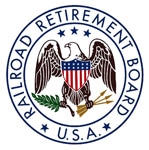
Under the CARES Act, the 1-week waiting period required before railroad workers can receive unemployment or sickness benefits is temporarily eliminated. This applies to an employee’s first two-week registration period for a period of continuing sickness or unemployment beginning after the effective date of the law and ending on or before December 31, 2020.
In addition, the amount of the unemployment benefit is increased by $1,200 per 2-week period. This is in addition to the current biweekly maximum of $733.98 received by most claimants. This increased amount applies to any two-week registration periods beginning on or after April 1, 2020, through July 31, 2020.
The CARES Act includes a separate appropriation of $425 million to pay for this added “recovery benefit,” with an additional $50 million provided to cover the cost of eliminating the waiting period. If these funds are exhausted, the new provisions will no longer apply.
The CARES Act also authorizes payment of extended unemployment benefits to rail workers who received unemployment benefits from July 1, 2019, to June 30, 2020.
Under the legislation, railroad workers with fewer than 10 years of service may be eligible for up to 65 days of extended benefits within seven consecutive two-week registration periods. Workers with 10 or more years of railroad service who were previously eligible for up to 65 days in extended benefits may now receive benefits for up to 130 days within 13 consecutive two-week registration periods.
Since RRB offices are currently closed to the public due to the COVID-19 pandemic, railroad employees are encouraged to file for unemployment benefits online by establishing an account through myRRB at RRB.gov. Employees are encouraged to use a computer rather than a smartphone or tablet due to RRB IT system limitations. Otherwise, applications and claims for benefits will need to be submitted by regular mail. Applications for sickness benefits must be submitted to the agency by mail, or by fax at 312-751-7185. Subsequent claims may be completed online by those with myRRB accounts.
The RRB will also pay sickness benefits and, in some cases, unemployment benefits, to rail workers who have tested positive for COVID-19 or who are subject to a quarantine order. Further guidance on these types of situations is available at RRB.gov/Benefits/Coronavirus.
Tag: myrrb

The purpose of this notice is to update you on how COVID-19 is impacting operations at the Railroad Retirement Board (RRB). Be assured, while it is not business as usual, the agency remains open for business. Listed below are some of the more notable changes. Last week, my office sent a press release to rail labor on some of these topics. Hopefully this message will include more detailed information for you and your members.
Field Service Operations:
Last week, my office sent a press release to rail labor advising that field offices are closed to the public. Whenever possible, agency personnel, including field personnel, are working from home. Unfortunately, we expect delays with processing incoming work because as you know, much of our work is not automated. We receive applications and claims for both unemployment and sickness by mail and by fax. Because of safety concerns surrounding COVID-19, staff is only going into the office or to the post office on Tuesdays and Thursdays.
Self-Service Options:
Because of our concern regarding the delay in processing paper applications and claims, we are encouraging railroaders to set up myRRB.gov accounts on the RRB.gov website. I have attached information about all the services available through that account. Please feel free to share with your memberships. With that account, an employee can file for and submit claims for unemployment. A railroader can also submit sickness claims, though not the initial application. Usually, an initial sickness application is either mailed or faxed in from the employee’s doctor’s office to the agency at (312) 751-7185. If an employee is unable to do that or if delays persist, please contact my office at (312) 751-4905 and my staff will assist you in any way they can.
Benefit Payments:
We have received questions regarding the continuation of retirement and disability benefits. Fortunately, that is overall an automated process and we do not expect any delays in paying those already established benefits. In addition, our actuary has assured us that the rail trust funds are well-positioned to pay all retirement, survivor, unemployment and sickness benefits. We are actively addressing questions regarding benefits payable under the RUIA and special circumstances raised by COVID-19.
Legislative Changes:
Related to legislative changes, there have been congressional proposals to remove sequestration from unemployment and sickness benefits; waive the statutory 7-day waiting period for unemployment and sickness benefits; increase the amount of unemployment benefits; and extend the duration of unemployment benefits. There have also been proposals to increase the RRB’s administrative budget in order to account for increased costs related to COVID-19. My staff, along with the agency’s Office of Legislative Affairs and other agency subject matter experts, have worked with congressional staffers as well as your unions to convey the information needed in order for the legislation to move forward.
These are trying times and the agency is doing its best to continue to pay the right people, the right benefits, at the right time. Things are changing quickly and I will update you in the future as the RRB makes adjustments. In the meantime, if you have any questions or problems, I and my staff are always available to assist.